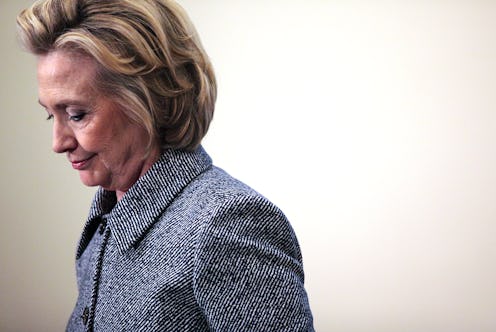News
Hillary Speaks On Guns, Race, And Charleston
Politicians from both sides of the aisle have been commenting on the deadly Charleston church shooting recently, an attack that took place on Wednesday night, leaving nine people dead. And one of the foremost voices among the 2016 presidential race just added some extensive thoughts — Hillary Clinton spoke on guns, race, and Charleston at a meeting of the U.S. Conference of Mayors in San Francisco on Saturday, and her words carried some weight.
As detailed by NBC News, Clinton invoked both of the two main political and cultural issues that have arisen since the shooting — advocacy for gun control reforms, and the toxic influence of racism throughout American history, from slavery clear through to today. On the former, she made a fair standard declaration within mainstream Democratic Party politics — calling for "common sense gun reforms" that nonetheless respect the rights of responsible owners — and on the latter, she urged against viewing this as "an isolated incident."
While there's not much surprise in Clinton's embrace of practical gun control reforms (like the expanded background check legislation that failed in the Senate two years ago), it will be interesting to see how directly she ends up addressing the influence of racism in American life. She touched on similar themes while discussing mass incarceration in April.
She began by emphasizing the gun control angle on the issue, which is exactly how President Obama wearily went about addressing it on Thursday.
For me and many others, one immediate response was to ask how it could be possible that we, as a nation, still allow guns to fall into the hands of people whose hearts are filled with hate. ... Now I lived in Arkansas, and I represented upstate New York. I know that gun ownership is part of the fabric of a lot of law-abiding communities. But I also know that we can have common sense gun reforms that keep weapons out of the hands of criminals, and the violently unstable, while respecting the rights of gun owners.
She followed up by referencing the "deep fault-line" of racism in America, however, the part of this equation that tends to go dismally unremarked upon.
Now it's tempting — it is tempting — to dismiss a tragedy like this as an isolated incident, to believe that in today's America, bigotry is largely behind us. That institutionalized racism no longer exists. But despite our best efforts and our highest hopes, America's long struggle with race is far from finished. ... Race remains a deep fault-line in America. Millions of people of color still experience racism in their everyday lives.
Here are some facts: in America today, blacks are nearly three times as likely as whites to be denied a mortgage. In 2013, the median wealth of black families was around $11,000. For white families, it was more than $134,000. Nearly half of all black families have lived in poor neighborhoods for at least two generations, compared to just seven percent of white families.
African-American men are far more likely to be stopped and searched by police, charged with crimes, and sentenced to longer prison terms than white men. Ten percent longer for the same crimes, in the federal system. In America today, our schools are more segregated than they were in the 1960s. How can any of this be true? How can it be true that black children are 500 percent more likely to die from asthma than white kids? 500 percent.
...Our problem is not all kooks and klansmen. It's also the cruel joke that goes unchallengerd. The offhand comment about not wanting "those people in the neighborhood." Let's be honest: for a lot of well-meaning, open-minded white people, the sight of a young black man in a hoodie still evokes a twinge of fear. And news reports about poverty, and crime, and discrimination evoke sympathy and even empathy, but too rarely do they spur us to action, or make us question our own assumptions and privilege.
We can't hide from any of these hard truths about race and justice in America. We have to name them, and own them, and then change them.
If you've got the time — an extra 14 minutes or so — her full remarks are definitely worth watching. She speaks with a candor on race that you'd be hard-pressed to hear from the Republican side, at the very least.
Images: NBC News; Getty Images
